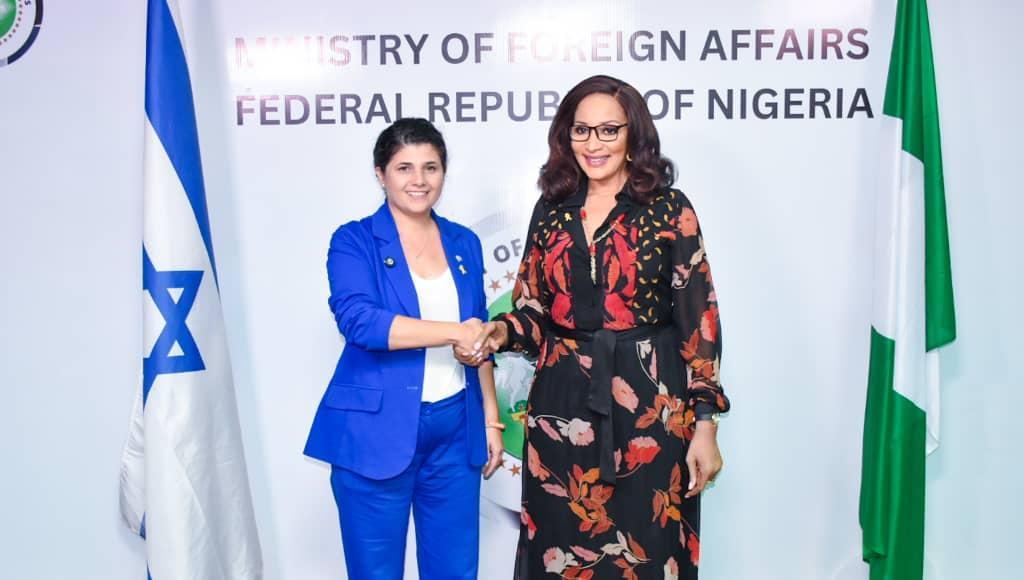By Abba Hamisu Sani
Africa-Press – Nigeria. Many Nigerians, including opinion leaders, expressed dissatisfaction with the recent pact signed between Nigeria and the State of Israel.
It could be recalled that on 11 August 2025, the Nigerian Minister of State for Foreign Affairs, Bianca Odumegwu-Ojukwu, and her counterpart, the Deputy Minister of Foreign Affairs of Israel, Sharren Haskel-Harpaz, reaffirmed their commitment to deepening collaboration in key areas including counter-terrorism, intelligence, information sharing, security financing, and training.
This was contained in a communiqué issued following a high-level political meeting.
According to Dr. Magnus Eze, Special Assistant on Communication and New Media, Office of the Minister of State for Foreign Affairs, the meeting reflected the enduring and strategic partnership between both nations.
He added that the discussions focused on critical multilateral issues such as global security, counter-terrorism, and bilateral political and economic cooperation.
“Both ministers endorsed the exchange of valuable ideas and initiatives that emerged during the dialogue,” he added.
Ulama Forum in Nigeria Condemns MoU with Zionist State of Israel
In a press release signed jointly by its Convener, Aminu Inuwa Muhammad, and Secretary, Basheer Adamu Aliyu, the Forum expressed strong opposition to the use of external Israeli security to address Nigeria’s internal security crises.
“We are deeply concerned by what appears to be a unilateral and undemocratic posture in question, inviting Israeli authorities to assist Nigeria in managing its internal security challenges,” the statement read.
The Forum stressed that Nigeria should have been at the forefront of countries lending support to South Africa’s genocide case against Israel at the International Court of Justice, because of its unconscionable genocide against the people of Palestine.
“The Minister of State for Foreign Affairs, Mrs. Bianca Ojukwu, who is widely reported to have engaged in a most risky and insensitive diplomatic romance with the Zionist and apartheid state of Israel at a time when the world of conscience is against Israel at the International Court of Justice (ICJ), is acting against the interest of the majority of Nigerians,” the Forum added.
The Ulama Forum in Nigeria said that this self-serving approach not only undermines national sovereignty but also poses a serious threat in terms of security issues.
It should be realized that internal security issues require homegrown solutions.
“It cannot be from a country that is being increasingly stigmatized for the massacre of innocent and defenceless women and children, due to its flagrant disregard for international law and human rights,” the organization added.
Dr. Sa’id Ahmad Dukawa, spokesperson of the Forum, advised the Federal Government to strengthen its security agencies and initiate policies that will give more confidence to citizens.
“Also important is to prioritize the fight against corruption with all seriousness and improve the economy right from the grassroots to eradicate abject poverty, which pushes many to become involved in terrorism,” he stressed.
Dr. Dukawa added that the Ulama Forum in Nigeria urged the Federal Government to be more committed in discharging its responsibilities in all aspects of development. Providing the necessary social amenities, education, and employment is critical to the fight against insecurity. There is a need for government at all levels to be up and doing.
The MoU: A Grave Threat to Nigeria’s Sovereignty
The Muslim Public Affairs Centre (MPAC), a non-governmental organization in Nigeria, also raised serious objections to Nigeria’s newly announced security partnership with Israel, warning that the agreement poses a grave threat to national sovereignty and risks entangling the country in alleged violations of international law.
In a statement issued recently, the Centre described the Memorandum of Understanding (MoU) between Nigeria’s Ministry of Foreign Affairs and the State of Israel—focusing on counter-terrorism, intelligence sharing, security financing, and advanced training—as a dangerous gamble that could have far-reaching consequences for Nigeria’s global standing and internal security.
The Executive Chairman of the Centre, Disu Kamor, who signed the press statement, questioned the wisdom of collaborating with a state currently facing international scrutiny for alleged war crimes and genocide in Gaza.
The organization pointed to ongoing proceedings at the International Court of Justice (ICJ), where Israel has been accused of grave human rights abuses, including mass civilian casualties and deliberate destruction of infrastructure in Gaza.
“To imagine that such a state, whose security doctrine is defined by unrestrained violence, collective punishment, and disregard for civilian immunity, can provide credible solutions to Nigeria’s security crisis is to embrace a dangerous illusion,” said MPAC.
The Risk of Crimes Against Humanity
The group cautioned that by engaging Israel at this juncture, Nigeria risks complicity in crimes against humanity.
“By allowing Israeli security contractors—who may deploy tactics and technologies tested on Palestinian civilians—into our security infrastructure, Nigeria risks violating its obligations under international law, which prohibits aiding or abetting breaches of humanitarian norms,” the statement read.
MPAC rejected the notion that Nigeria’s security challenges can be solved through foreign intervention, arguing that genuine security must come from internal reforms and investment.
It added that from Mali to Somalia, foreign security arrangements have led to long-term dependence and weakened institutions.
Israel’s interests in Nigeria are not altruistic; they are commercial, geopolitical, and strategic.
For More News And Analysis About Nigeria Follow Africa-Press







